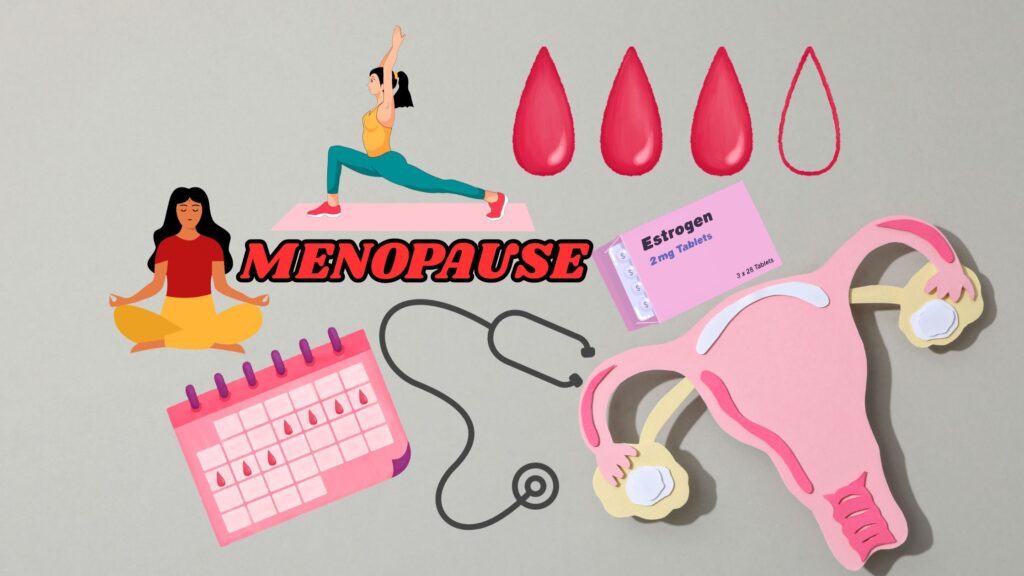Menopause and perimenopause are natural biological stages that mark the end of a woman’s reproductive years. While every woman experiences them differently, these phases can bring significant physical, emotional, and psychological changes. Understanding them helps women prepare, cope, and even thrive during this transition.
What Is Menopause?
Menopause is defined as the permanent end of menstruation and fertility, occurring 12 months after a woman’s last menstrual period. It usually happens between the ages of 45 and 55, with the average age being around 51. However, some women may experience early menopause due to genetic factors, medical conditions, or surgeries like hysterectomy.
Menopause occurs because the ovaries gradually stop producing the hormones estrogen and progesterone, which regulate the menstrual cycle. As these hormone levels decline, periods become irregular and eventually stop altogether.
What Is Perimenopause?
Perimenopause, often called the menopause transition, is the period leading up to menopause. It can start as early as a woman’s late 30s or early 40s and can last anywhere from a few months to several years (typically 4–10 years). During this time, hormone levels fluctuate, leading to various symptoms that may affect daily life.
Perimenopause is not a disease but a phase of change, and it is the body’s way of adjusting to lower hormone levels before reaching menopause.
Common Symptoms of Perimenopause and Menopause
The symptoms vary greatly from woman to woman. Some women breeze through these changes with little discomfort, while others find the symptoms disruptive. Common symptoms include:
-
Irregular periods: Cycles may shorten, lengthen, or become more unpredictable.
-
Hot flashes and night sweats: Sudden feelings of heat, flushing, and sweating, especially at night.
-
Mood swings and irritability: Hormonal changes can affect brain chemistry, leading to emotional ups and downs.
-
Sleep disturbances: Difficulty falling or staying asleep, often due to night sweats or anxiety.
-
Vaginal dryness: Thinning vaginal tissues can cause discomfort during intercourse.
-
Decreased libido: A reduction in sexual desire is common.
-
Weight gain: Especially around the abdomen, due to hormonal shifts and a slowing metabolism.
-
Memory problems: Some women report “brain fog” or forgetfulness.
-
Hair thinning or skin dryness: These changes reflect the drop in estrogen levels.
Emotional and Mental Health Impacts
Hormonal fluctuations can affect more than just the body. Many women report increased anxiety, depression, or a general feeling of emotional instability during perimenopause and menopause. These emotional changes can be confusing, especially if they occur alongside life changes such as aging parents, children leaving home, or career shifts.
It’s important to acknowledge these feelings and seek support—whether through therapy, support groups, or simply talking to trusted friends or family.
Health Risks After Menopause
Postmenopausal women face increased health risks, primarily due to lower estrogen levels. These include:
-
Osteoporosis: Loss of bone density, increasing fracture risk.
-
Heart disease: Estrogen helps maintain healthy blood vessels, so its decline raises cardiovascular risk.
-
Urinary issues: Incontinence or increased frequency can develop due to weakened pelvic muscles.
-
Cognitive decline: Some studies suggest a link between menopause and memory challenges.
Regular health screenings, including bone density tests and cholesterol checks, become even more important after menopause.
Managing Symptoms and Supporting Health
Managing menopause and perimenopause involves a combination of lifestyle changes, medical support, and emotional care:
1. Lifestyle Changes
-
Nutrition: A balanced diet rich in calcium, vitamin D, whole grains, enough protein and healthy fats supports bone and heart health. Avoid Processed, Sugary and Fried Items.
-
Exercise: Regular physical activity helps with mood, weight management, and bone strength. Include Strength Training a part of life.
-
Sleep hygiene: A consistent sleep routine, avoiding caffeine before bed, and creating a relaxing bedtime environment can improve sleep quality.
2. Hormone Replacement Therapy (HRT)
HRT can be effective for relieving hot flashes, vaginal dryness, and other symptoms. However, it may not be suitable for all women, especially those with a history of breast cancer, blood clots, or heart disease. Always consult a healthcare provider before starting any hormone therapy.
3. Natural and Alternative Therapies
Some women find relief through:
-
Herbal supplements (like black cohosh or soy isoflavones) (After consultation only)
-
Yoga and meditation
-
Acupuncture
-
Ayurvedic treatments (under the guidance of an experienced practitioner)
Empowerment Through Awareness
While menopause and perimenopause can feel overwhelming, they also offer a time for reflection, renewal, and self-care. With the right support and mindset, women can navigate this stage gracefully and healthily. Talking openly about menopause helps break the stigma and allows women to support one another through shared experiences.
Menopause is not an end—it is a new beginning. It’s a time to embrace wisdom, prioritize health, and celebrate the strength that comes with age.



